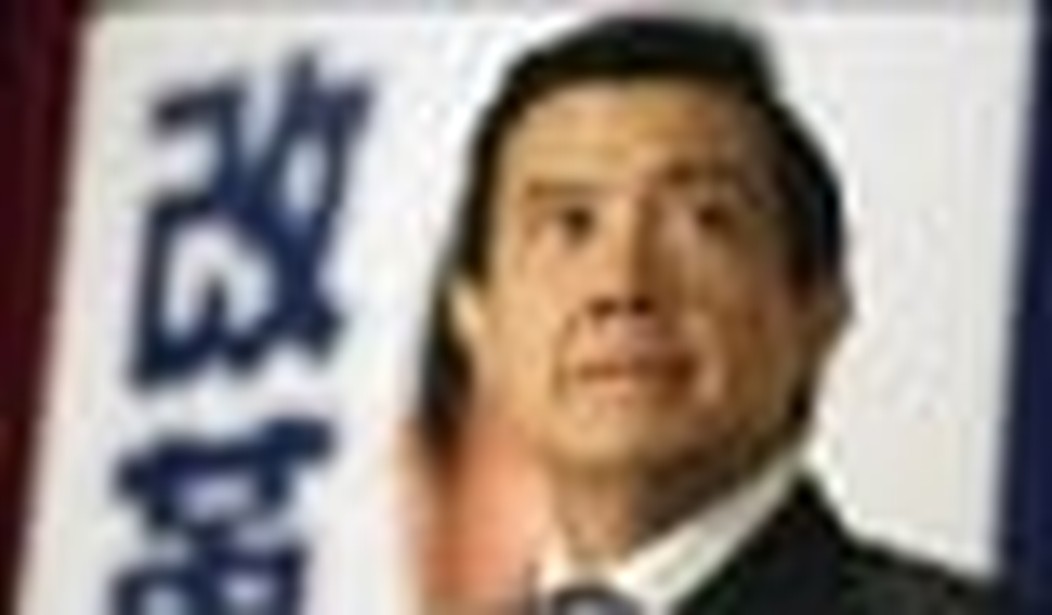On Saturday, Taiwanese voters, in four closely watched by-elections for seats in the national legislature, expressed growing dissatisfaction with the ruling Kuomintang (KMT).
The opposition Democratic Progressive Party retained one seat it previously held and won in two Kuomintang strongholds. The ruling party avoided a sweep by narrowly holding onto a safe “deep blue” seat. The DPP, often known as the green party, increased its percentages in all four districts. “This is the KMT’s fourth election setback, and this deals a fresh blow to President Ma Ying-jeou’s popularity and the party’s morale,” said Hsu Yung-ming of Soochow University.
“It tells President Ma, who doubles as KMT chairman, that he should stop trying to woo voters from the opposition Pan-green camp,” said Lin Huo-wang, a presidential advisor, referring to the stinging defeat. “A political party will not be able to hold its core support if it drifts further away from its ideals.”
And what are those ideals? In 2008, the Kuomintang, or Nationalist Party, won landslide victories, first in the January legislative elections and then in the March presidential contest. President Ma interpreted those wins as a mandate to more closely integrate Taiwan with China, and as a part of that effort he abandoned the notion, maintained by his two predecessors, that Taiwan is a nation separate from the People’s Republic. He has also signed various deals with Beijing to more closely integrate the Taiwanese and Chinese economies.
China’s friends in America have consistently maintained that the Taiwanese voted for the KMT and Ma because they wanted to reconcile with Beijing. Take the always-interesting George Gilder, for example. The American futurologist, in his recent Wall Street Journal essay, argues that “some Taiwanese politicians” may dream of independence, but the rest of the island has placed its bet on the Chinese giant next door. In this regard he glowingly points to Taiwan’s “world-beating entrepreneurs” establishing links with China, two-thirds of its companies making investments there, and three-quarters of a million of its people residing on the Chinese side of the Strait. And from these facts he somehow concludes that Washington should stop selling Taiwan weapons.
Gilder, as we saw from Saturday’s election, gets the mood of the Taiwanese people wrong. They may want better economic ties with China — who doesn’t? — but they also want American arms to protect their society.
And they don’t want to be abandoned by the United States, something that more and more Washington analysts — like David Rothkopf, a Clinton-era official now at the Carnegie Endowment for International Peace — think we should do. Americans should start paying attention to the fact that Ma Ying-jeou’s unificationist policies are increasingly unpopular. A poll, carried out by the Taiwan government at the end of last year and released late February, shows that no more than 37 percent of the public favor President Ma’s cross-Strait policies. That result was the worst of his presidency. Surveys by independent organizations show even less support for the now-embattled Taiwan leader and his China plans.
The remarkable fact of Taiwan politics is that, regardless of which party is in power and which organization conducts the polling, support for unification remains in the single digits. In an October poll, for instance, 8.3 percent of the public said they wanted Taiwan to become part of the People’s Republic, 29.3 percent favored wider international recognition of the island’s independent status, and 51.7 percent opted for the status quo — best described as de facto independence. These results are remarkably consistent with other surveys.
Lin Huo-wang, therefore, may be correct that the Kuomintang should try to rally its base by affirming its ideals, but the fact remains that most Taiwan voters do not support the party’s views on the core issue in island politics — namely, its political status with China. This divergence does not mean the KMT will necessarily fare poorly in the city and county elections this December, considered to be bellwethers for the all-important 2012 presidential contest. Many local factors will, of course, come into play in these contests.
Yet over time it is becoming clear that local factors are becoming less important to the outcome of local elections. With each successive KMT failure in even deep-blue districts — and with each DPP victory — an unmistakable trend is forming. These continuing successes for the independence-minded opposition means that it is time for Gilder, Rothkopf, and other Americans to stop assuming that Taiwan wants to be absorbed by the Chinese leviathan and made its 34th province.
Until the Taiwanese unambiguously tell us they desire to give up political freedoms they struggled decades to obtain, Washington needs to stand behind their vibrant democracy. That is the real meaning of the KMT’s string of electoral defeats.









Join the conversation as a VIP Member